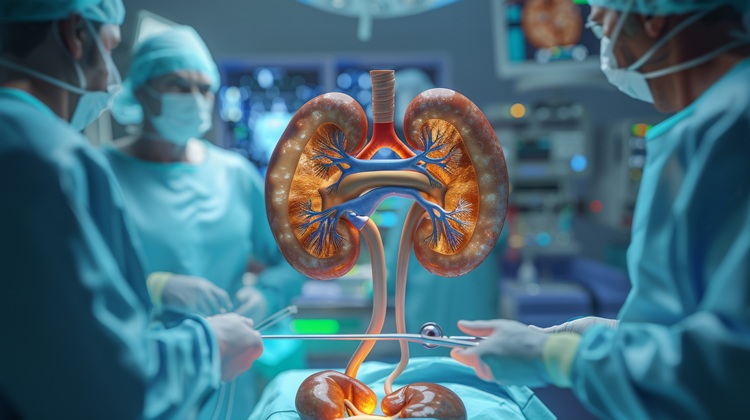RIRS Surgery: A Modern, Minimally Invasive Solution for Kidney Stones
2025-08-13 / RG STONE HOSPITAL / Urinary / Kidney Stone

Kidney stones are a common urological problem affecting millions worldwide. While small stones may pass naturally, larger or complex stones often require medical intervention. One of the most advanced and minimally invasive procedures for removing kidney stones is RIRS – Retrograde Intrarenal Surgery. This technique offers precision, faster recovery, and minimal discomfort compared to traditional open surgeries.
What is RIRS Surgery?
RIRS (Retrograde Intrarenal Surgery) is a minimally invasive surgical procedure performed to remove stones or treat other conditions inside the kidney.
The term retrograde means “moving against the flow,” and intrarenal means “inside the kidney.” In RIRS, a flexible ureteroscope is passed through the urinary tract (via the urethra and bladder) into the kidney to access and treat stones without making any external incision.
When is RIRS Recommended?
RIRS is particularly useful in cases where:
-
Kidney stones are small to medium-sized (usually up to 2 cm).
-
Stones are located in difficult-to-reach areas of the kidney.
-
ESWL (Shock Wave Lithotripsy) has failed.
-
The patient has bleeding disorders and needs a safe, less invasive option.
-
Stones are in patients with obesity or other anatomical challenges.
How is RIRS Surgery Performed?
-
Anaesthesia: RIRS is generally performed under general anaesthesia to ensure patient comfort.
-
Accessing the Kidney: The surgeon inserts a thin, flexible ureteroscope through the urethra, bladder, and ureter to reach the kidney.
-
Stone Visualisation: The high-definition camera on the scope allows the surgeon to see the stone clearly.
-
Stone Fragmentation: A laser (often Holmium:YAG laser) is used to break the stone into fine dust or small fragments.
-
Stone Removal: The tiny fragments are either left to pass naturally in urine or removed with a special basket.
-
Stent Placement: A temporary stent may be placed in the ureter to aid healing and urine flow.
Advantages of RIRS Surgery
-
No external cuts or stitches – reduces pain and infection risk.
-
High success rate even for complex stone locations.
-
Short hospital stay – often discharged within 24 hours.
-
Quick recovery – return to normal activities within a few days.
-
Safe for high-risk patients – suitable for people with bleeding disorders or obesity.
-
Better precision – surgeon can directly visualise and target the stone.
Possible Risks & Complications
While RIRS is generally safe, like any medical procedure, it carries minimal risks:
-
Mild pain or discomfort during urination for a few days.
-
Temporary blood in urine.
-
Urinary tract infection (UTI).
-
Rarely, ureteral injury or stricture.
These risks are usually manageable with medications and proper post-operative care.
Recovery & Aftercare
-
Drink plenty of water to flush out any remaining stone particles.
-
Take prescribed antibiotics and pain relief as directed.
-
Avoid heavy physical activities for a week.
-
Follow up with your urologist to remove the stent (if placed).
-
Maintain a kidney-friendly diet to prevent stone recurrence.
Preventing Kidney Stones After RIRS
Since kidney stones can recur, preventive steps are essential:
-
Stay hydrated – aim for 2–3 litres of water daily.
-
Reduce salt and animal protein intake.
-
Limit foods high in oxalates (like spinach, nuts, and chocolate).
-
Manage underlying conditions like gout or urinary infections.
Conclusion
RIRS surgery has revolutionised kidney stone treatment with its minimally invasive approach, high precision, and faster recovery. If you are suffering from kidney stones, consulting a qualified urologist can help determine if RIRS is the best option for you.
With proper aftercare and preventive measures, you can not only recover quickly but also minimise the chances of stones coming back — ensuring a healthier, pain-free life.
Categories
Hernia Repair
Appendicitis
Piles
Urological Treatment
Hernia treatment
Enlarged Prostate (BPH)
Gall Bladder Stone
Urinary / Kidney Stone
Vitamins
Indian Health Care System
Exercise
Obesity
Female Urinary Incontinence
Single Incision Laparoscopic Surgery (SILS)
Kidney Cancer
Bladder Cancer
Ovarian cancer
Nephrology
Bariatric Surgery
Kidney Function Test
Female Urology
Radiation Therapy
Alcoholic Fatty Liver
Liver disease
Gastroenterology
Kidney Disease
Nutrition & Health
Lung Cancer

